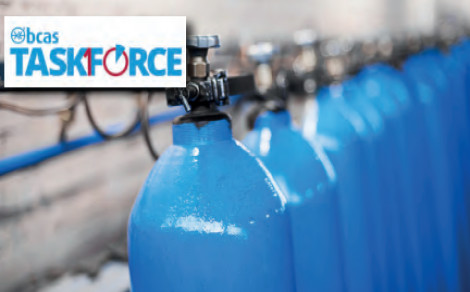10% Taskforce campaign – changing behaviours

In April last year, BCAS launched its 10% Taskforce initiative to encourage compressed air users to cut their energy consumption from compressed air by 10%.
In the first month alone, BCAS members demonstrated how they had helped customers save 5457 MWh in otherwise wasted energy – the equivalent of powering 1,800,810 homes for one hour – or 1631 homes continuously.
A compressed air system is just that; a system, and every element of it impacts on its energy consumption. Therefore, when exploring the potential savings that could be realised, it is important to take a full, system approach, – from generation to air treatment to distribution and finally, the point of use.
Change behaviours. Substantial efficiency improvements can be made by implementing new processes and encouraging staff to use compressed air more efficiently and safely.
Control better. BCAS members can advise on the best equipment and system for the application. This could include incorporating fixed and variable-speed drives or a combination of both as well as efficient downstream equipment.
Fix leaks. Reducing air leaks can have the biggest impact on overall system efficiency. Leak rates in industrial systems are typically between 20 and 40%, meaning the compressor must work harder, and therefore consume more energy, to compensate for the pressure loss.
Recover heat. As much as 95% of the energy consumed by a compressor is converted to heat and, unless captured, will be wasted to the atmosphere. Many manufacturers offer heat recovery systems, which can often be retrofitted. These recycle this excess heat; redirecting the hot oil to an oil-to-water heat exchanger.
Manage air downstream. Treating air to remove dirt, water and oil is necessary but can use a lot of energy. The process is likely to only need a proportion of the compressed air to be treated to a very high purity. In these cases, excellent savings are achievable by treating all the generated air to the minimum acceptable level and improving the purity (quality) to the desired level at the usage point.
Service and maintenance. Low cost, regular maintenance will help retain low leak rates and reliability of equipment. Operators should consider a policy that specifies that energy efficient options are purchased when replacing all equipment – whether it is a basic drain valve through to the actual compressor unit itself equipment.
For further information, please visit: taskforce10.bcas.org.uk
https://www.linkedin.com/company/british-compressed-air-society/
-
PPMA 2025
23 September, 2025, 9:30 - 25 September, 2025, 16:00
NEC, Birmingham UK -
Advanced Engineering Show 2025
29 October, 2025, 9:00 - 30 October, 2025, 16:00
NEC, Birmingham UK










